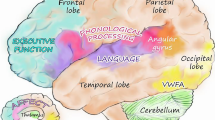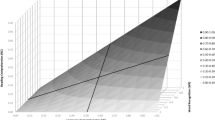Abstract
Although best known for work with children and adults with intellectual disabilities and autism spectrum disorders, training in speech pathology and a doctorate in clinical psychology and neuropsychology was the foundation for Sara Sparrow’s long-term interest in reading disabilities. Her first papers were on dyslexia and laterality, and the maturational lag theory of developmental dyslexia proposed with Paul Satz, her mentor. The research program that emerged from this work had a wide impact on early neuropsychological models of reading disabilities. Although Sara went on to research focused on children with other developmental disabilities after she moved to Yale University, this initial research influenced her career- long interests in assessment, developmental models of disabilities, and early screening methods.
Similar content being viewed by others
References
Benton, A. L. (1975). Development dyslexia: Neurological aspects. In W. J. Friedlander (Ed.), Advances in Neurology (Vol. 7, pp. 1–47). New York: Raven Press.
Brady, S. A., & Shankweiler, D. P. (Eds.). (1991). Phonological processes in literacy. Hillsdale, NJ: Erlbaum.
Denckla, M. B., Rudel, M. B., Krieger, R. G., & Chapman, J. (1985). Motor proficiency in dyslexic children with and without attentional disorders. Archives of Neurology, 42, 228–231.
Fletcher, J. M., Lyon, G. R., Fuchs, L. S., & Barnes, M. A. (2007). Learning disabilities: From identification to intervention. New York: Guilford.
Fletcher, J. M., Satz, P., & Morris, R. (1984). The Florida longitudinal project: A review. In S. A. Mednick, M. Harway, & K. M. Finnello (Eds.), Handbook of longitudinal research (Vol. 1, pp. 280–304). New York: Praeger.
Fletcher, J. M., Shaywitz, S. E., Shankweiler, D., Katz, L., Liberman, I. Y., Steubing, K. K., et al. (1994). Cognitive profiles of reading disability: Comparisons of discrepancy and low achievement definitions. Journal of Educational Psychology, 86, 6–23.
Fletcher, J. M., Taylor, H. G., Morris, R., & Satz, P. (1982). Finger recognition skills and reading achievement: A developmental neuropsychological analysis. Developmental Psychology, 18, 124–132.
Fletcher, J. M., & Vaughn, S. (2009). Response to intervention: Preventing and remediating academic deficits. Child Development and Perspectives, 3, 30–37.
Francis, D. J., Shaywitz, S. E., Stuebing, K. K., Shaywitz, B. A., & Fletcher, J. M. (1996). Developmental lag versus deficit models of reading disability: A longitudinal, individual growth curves analysis. Journal of Educational Psychology, 88, 3–17.
Gibson, E. J., & Levin, H. (1980). The psychology of reading. Cambridge, MA: MIT Press.
Mann, L. (1979). On the trail of process. New York: Grune and Stratton.
Morris, R., & Fletcher, J. M. (1988). Classification in neuropsychology: A theoretical framework and research paradigm. Journal of Clinical and Experimental Neuropsychology, 10, 640–658.
Orton, S. T. (1925). ‘Word-blindness’ in school children. Archives of Neurology and Psychiatry, 14, 285–516.
Rourke, B. P. (1975). Brain-behavior relationships in children with learning disabilities: A research program. American Psychologist, 30, 911–920.
Rourke, B. P. (1976). Reading retardation in children: Developmental lag or deficit? In R. M. Knights & D. J. Bakker (Eds.), Neuropsychology of learning disorders: Theoretical approaches (pp. 125–137). Baltimore, MD: University Park Press.
Rutter, M. (1982). Syndromes attributed to “minimal brain dysfunction” in childhood. American Journal of Psychiatry, 139, 21–33.
Satz, P., & Fletcher, J. M. (1982). The Florida Kindergarten Screening Battery. Odessa, Florida: Psychological Assessment Resources.
Satz, P., Fletcher, J. M., Clark, W., & Morris, R. (1981). Lag, deficit, rate and delay constructs in specific learning disabilities: A re-examination. In A. Answara, N. Geschwind, A. Galaburda, M. Albert, & N. Gartrell (Eds.), Sex differences in dyslexia (pp. 129–150). Towson, Maryland: The Orton Dyslexia Society.
Satz, P., & Morris, R. (1981). Learning disability subtypes: A review. In F. J. Pirozzolo & M. C. Wittrock (Eds.), Neuropsychological and cognitive processes in reading (pp. 109–141). New York: Academic Press.
Satz, P., Rardin, D., & Ross, J. (1971). An evaluation of a theory of specific developmental dyslexia. Child Development, 42, 2009–2021.
Satz, P., & Sparrow, S. S. (1970). Specific developmental dyslexia: A theoretical formulation. In D. J. Bakker & P. Satz (Eds.), Specific reading disability: Advances in theory and method. Rotterdam: Rotterdam University Press.
Satz, P., Taylor, H. G., Friel, J., & Fletcher, J. M. (1978). Some developmental and predictive precursors of reading disability. In A. L. Benton & D. Pearl (Eds.), Dyslexia: An appraisal of current knowledge (pp. 457–501). New York: Oxford University Press.
Satz, P., & Van Nostrund, G. K. (1973). Developmental dyslexia: An evaluation of a theory. In P. Satz & J. Ross (Eds.), The disabled learner: Early detection and intervention. Rotterdam: Rotterdam University press.
Schatschneider, C., Fletcher, J. M., Francis, D. J., Carlson, C. D., & Foorman, B. R. (2004). Kindergarten prediction of reading skills: A longitudinal comparative analysis. Journal of Educational Psychology, 96, 265–282.
Shavelson, R., & Towne, L. (2002). Science and education. Washington, DC: National Academy of Sciences.
Shaywitz, S. E., Escobar, M. D., Shaywitz, B. A., Fletcher, J. M., & Makuch, R. (1992). Evidence that dyslexia may represent the lower tail of a normal distribution of reading ability. New England Journal of Medicine, 326, 145–150.
Shaywitz, B. A., Shaywitz, S. E., Blachman, B. A., Pugh, K. R., Fulbright, R. K., Skudlarski, P., et al. (2004). Development of left occipitotemporal systems for skilled reading children after a phonologically-based intervention. Biological Psychiatry, 55, 926–933.
Simos, P. G., Fletcher, J. M., Bergman, E., Breier, J. I., Foorman, B. R., Castillo, E. M., et al. (2002). Dyslexia-specific brain activation profile becomes normal following successful remedial training. Neurology, 58, 1203–1213.
Sparrow, S. S. (1969a). Reading disability and laterality. In Proceedings of the 77th annual convention of the american psychological association: Part 2, 4. Washington DC: American Psychological Association.
Sparrow, S. S. (1969b). Dyslexia and laterality: Evidence for a developmental theory. Seminars in Psychiatry, 1(3), 270–277.
Sparrow, S. S., Balla, D. A., & Cicchetti, D. V. (1984). Vineland Adaptive Behavior Scales. Circle Pines MN: American Guidance Services.
Sparrow, S. S., Blachman, B. A., & Chauncey, S. (1983). Diagnostic and prescriptive intervention in primary school education. American Journal of Orthopsychiatry, 53, 721–729.
Sparrow, S. S., Cicchetti, D. V., & Balla, D. A. (2005). Vineland Adaptive Behavior Scales (2nd ed.). San Antonio TX: Pearson.
Sparrow, S. S., & Satz, P. (1970). Dyslexia, laterality, and neuropsychological development. In D. F. Bakker & P. Satz (Eds.), Specific reading disability: Advances in theory and method. Rotterdam: Rotterdam University Press.
Sparrow, S. S., & Ziegler, E. (1978). Evaluation of a patterning treatment for retarded children. Pediatrics, 62, 137–150.
Stanovich, K. E. (2000). Progress in understanding reading. New York: Guilford.
Taylor, H. G., Satz, P., & Friel, J. (1979). Developmental dyslexia in relation to other childhood reading disorders: significant and clinical utility. Reading Research Quarterly, 1(15), 84–101.
Vellutino, F. R. (1979). Dyslexia: Theory and research. Cambridge, MA: MIT Press.
Acknowledgments
Supported in part by a grant from the National Institute for Child Health and Human Development, 1 P50 HD052117, Texas Center for Learning Disabilities.
Author information
Authors and Affiliations
Corresponding author
Rights and permissions
About this article
Cite this article
Fletcher, J.M., Morris, R.D. Reading, Laterality, and the Brain: Early Contributions on Reading Disabilities by Sara S. Sparrow. J Autism Dev Disord 44, 250–255 (2014). https://doi.org/10.1007/s10803-011-1273-2
Published:
Issue Date:
DOI: https://doi.org/10.1007/s10803-011-1273-2




